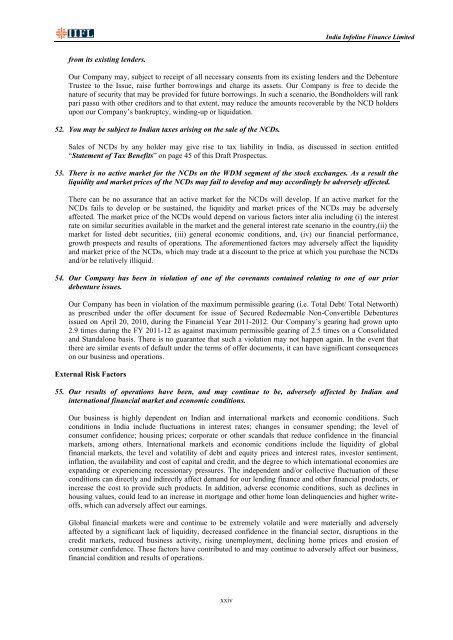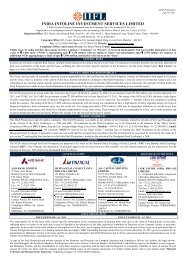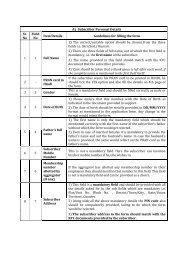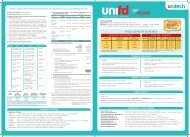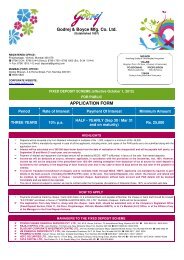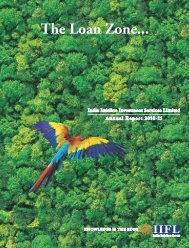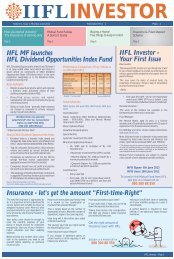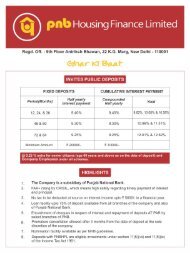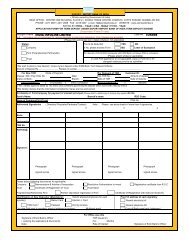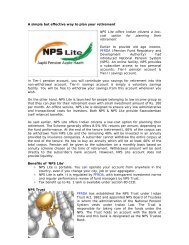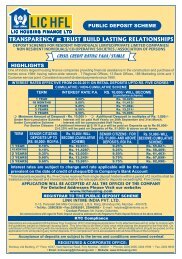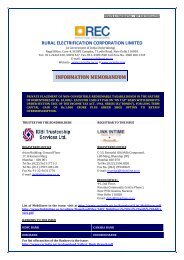INDIA INFOLINE FINANCE LIMITED - Securities and Exchange ...
INDIA INFOLINE FINANCE LIMITED - Securities and Exchange ...
INDIA INFOLINE FINANCE LIMITED - Securities and Exchange ...
You also want an ePaper? Increase the reach of your titles
YUMPU automatically turns print PDFs into web optimized ePapers that Google loves.
India Infoline Finance Limited<br />
from its existing lenders.<br />
Our Company may, subject to receipt of all necessary consents from its existing lenders <strong>and</strong> the Debenture<br />
Trustee to the Issue, raise further borrowings <strong>and</strong> charge its assets. Our Company is free to decide the<br />
nature of security that may be provided for future borrowings. In such a scenario, the Bondholders will rank<br />
pari passu with other creditors <strong>and</strong> to that extent, may reduce the amounts recoverable by the NCD holders<br />
upon our Company’s bankruptcy, winding-up or liquidation.<br />
52. You may be subject to Indian taxes arising on the sale of the NCDs.<br />
Sales of NCDs by any holder may give rise to tax liability in India, as discussed in section entitled<br />
“Statement of Tax Benefits” on page 45 of this Draft Prospectus.<br />
53. There is no active market for the NCDs on the WDM segment of the stock exchanges. As a result the<br />
liquidity <strong>and</strong> market prices of the NCDs may fail to develop <strong>and</strong> may accordingly be adversely affected.<br />
There can be no assurance that an active market for the NCDs will develop. If an active market for the<br />
NCDs fails to develop or be sustained, the liquidity <strong>and</strong> market prices of the NCDs may be adversely<br />
affected. The market price of the NCDs would depend on various factors inter alia including (i) the interest<br />
rate on similar securities available in the market <strong>and</strong> the general interest rate scenario in the country,(ii) the<br />
market for listed debt securities, (iii) general economic conditions, <strong>and</strong>, (iv) our financial performance,<br />
growth prospects <strong>and</strong> results of operations. The aforementioned factors may adversely affect the liquidity<br />
<strong>and</strong> market price of the NCDs, which may trade at a discount to the price at which you purchase the NCDs<br />
<strong>and</strong>/or be relatively illiquid.<br />
54. Our Company has been in violation of one of the covenants contained relating to one of our prior<br />
debenture issues.<br />
Our Company has been in violation of the maximum permissible gearing (i.e. Total Debt/ Total Networth)<br />
as prescribed under the offer document for issue of Secured Redeemable Non-Convertible Debentures<br />
issued on April 20, 2010, during the Financial Year 2011-2012. Our Company’s gearing had grown upto<br />
2.9 times during the FY 2011-12 as against maximum permissible gearing of 2.5 times on a Consolidated<br />
<strong>and</strong> St<strong>and</strong>alone basis. There is no guarantee that such a violation may not happen again. In the event that<br />
there are similar events of default under the terms of offer documents, it can have significant consequences<br />
on our business <strong>and</strong> operations.<br />
External Risk Factors<br />
55. Our results of operations have been, <strong>and</strong> may continue to be, adversely affected by Indian <strong>and</strong><br />
international financial market <strong>and</strong> economic conditions.<br />
Our business is highly dependent on Indian <strong>and</strong> international markets <strong>and</strong> economic conditions. Such<br />
conditions in India include fluctuations in interest rates; changes in consumer spending; the level of<br />
consumer confidence; housing prices; corporate or other sc<strong>and</strong>als that reduce confidence in the financial<br />
markets, among others. International markets <strong>and</strong> economic conditions include the liquidity of global<br />
financial markets, the level <strong>and</strong> volatility of debt <strong>and</strong> equity prices <strong>and</strong> interest rates, investor sentiment,<br />
inflation, the availability <strong>and</strong> cost of capital <strong>and</strong> credit, <strong>and</strong> the degree to which international economies are<br />
exp<strong>and</strong>ing or experiencing recessionary pressures. The independent <strong>and</strong>/or collective fluctuation of these<br />
conditions can directly <strong>and</strong> indirectly affect dem<strong>and</strong> for our lending finance <strong>and</strong> other financial products, or<br />
increase the cost to provide such products. In addition, adverse economic conditions, such as declines in<br />
housing values, could lead to an increase in mortgage <strong>and</strong> other home loan delinquencies <strong>and</strong> higher writeoffs,<br />
which can adversely affect our earnings.<br />
Global financial markets were <strong>and</strong> continue to be extremely volatile <strong>and</strong> were materially <strong>and</strong> adversely<br />
affected by a significant lack of liquidity, decreased confidence in the financial sector, disruptions in the<br />
credit markets, reduced business activity, rising unemployment, declining home prices <strong>and</strong> erosion of<br />
consumer confidence. These factors have contributed to <strong>and</strong> may continue to adversely affect our business,<br />
financial condition <strong>and</strong> results of operations.<br />
xxiv


